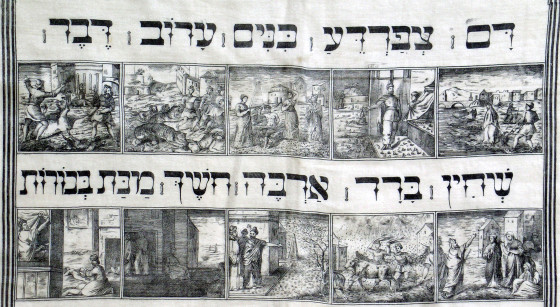The ten plagues brought by God upon the Egyptians were a serious matter. Water and food sources were destroyed, flocks and herds were decimated and there was a significant loss of human life. But one of the plagues seems to be more about comic relief than divine vengeance:
The Lord said to Moses, “Go to Pharaoh and say to him, ‘Thus says the Lord: Let My people go that they may worship Me. If you refuse to let them go, then I will plague your whole country with frogs. The Nile shall swarm with frogs, and they shall come up and enter your palace, your bedchamber and your bed, the houses of your courtiers and your people, and your ovens and your kneading bowls. The frogs shall come up on you and on your people and on all your courtiers.'” (Ex. 7:26-29)
And indeed, without even giving Pharaoh a chance to comply:
And the Lord said to Moses, “Say to Aaron: Hold out your arm with the rod over the rivers, the canals, and the ponds, and bring up the frogs on the land of Egypt.” Aaron held out his arm over the waters of Egypt, and the frogs came up and covered the land of Egypt. But the magicians did the same with their spells, and brought frogs upon the land of Egypt. (ibid. 8:1-3)
The artist (I look forward to learning more about the origins of this illustration) appears to be having some fun with this scene. While the frogs are everywhere, on the floor, on the table, clinging to the table-cloth and even wreaking havoc on the street in the distance, the human characters – presumably Pharaoh and his entourage are going about their business of eating and merry-making.
We find the same jovial attitude of interpretation in rabbinic literature as well:
“And the frog(s) came up, and covered the land of Egypt” – R. Eleazar said: It was one frog, which bred prolifically and filled the land. But this is a matter disputed by the early sages: R. Akiba said: There was one frog which filled the whole of Egypt [by breeding]. But R. Elazar b. Azariah said to him, ‘Akiba, what do you know about agadic (non-legal matters of legend) interpretation? Be quiet and stick with laws of ritual impurity!’ And then added, ‘the correct interpretation is that one frog croaked for the others, and they came’. (Bab. Talmud Sanhedrin 67b)
In the original Hebrew, the word for frog is tzfardea, which is used both for the singular and plural, hence giving the rabbis their creative license. The joke is that when R. Akiva, well-known for his legal expertise in even the most difficult field of ritual impurity, tries his hand at this “lighter” type of commentary, he is “admonished” by R. Elazar b. Azariah who comes up with a far more fanciful reading.
The point is not to minimize the suffering reported in the Exodus narrative, neither that of the Hebrews who suffered as slaves under Pharaoh, nor the Egyptian people who paid the price of their king’s hardened heart. But to show that a little bit of humor can help lighten up even the darkest of times.
Shabbat Shalom



